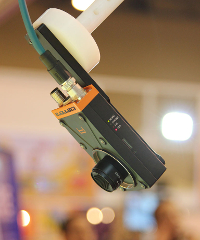Start-up snapshot: Smarter factories with cameras that act as human eyes
Start-up: QEYE, Egypt

Egyptian start-up QEYE produces technology that can detect defects in cloth, such as holes and errors in colour and dyeing.
QEYE is an Egyptian start-up specialised in the production of ‘smart’ camera technology in which the camera plays the role of the human eye in industrial quality inspection. The aim is to improve manufacturing quality in a number of industries – including, but not limited to, textiles, paper and plastic.
Founded in 2013, two of QEYE’s products are used mainly in the textile sector, and can detect defects in cloth, such as holes and errors in colour and dyeing. How we made it in Africa talks to the founder, Mahmoud Abdel Aziz, about his visions and plans for the start-up.
1. How did you finance your start-up?
We were incubated at Technology Innovation and Entrepreneurship Centre (TIEC) who support us through mentorship and financial assistance to grow quickly. Now we are bootstrapping until we start to expand and request new investment.
2. If you were given US$1m to invest in your company now, where would it go?
If I had that sort of money, I’d continue the company’s existing expansion plan of penetrating large textile markets like India and Bangladesh with a chain of quality inspection products. We’d also aim to expand into other sectors needing automatic quality inspection, especially the agriculture sector.
3. What risks does your business face?
We are currently bootstrapping, so we are working at a slow rate. We need to spread awareness first, before working with customers as most of them fear using technology-based applications.
4. So far, what has proven the most successful form of marketing?
As we are business-to-business, the best strategy has been attending or exhibiting in fairs and at conferences with many networking and communications activities. So we exhibited at Egy Stitch and Tex Fair in Egypt, Smart Factory Innovation Forum in Germany, and Euromed Business Opportunities Roadshow in Egypt and Tunisia. In addition, using graphics and visual materials make reaching people easier.
5. Describe your most exciting entrepreneurial moment.
Meeting customers and trying to convince them our products have value. Some become inspired because we develop our systems locally. This is new for them as they’ve always had to buy their production machines and tools abroad. In addition, when we exhibited at Smart Factory Innovation Forum organised by Munich Network in Germany, we were the only company outside Europe.
And as such, all present were impressed we had come from Egypt to Germany to show new products with a focus on smart factories, or Industry 4.0.
6. What has been the biggest mistake you have made in your start-up, and what have you learnt from it?
That we did not conduct market research efficiently enough to detect the customer’s real pain, and to find the most suitable solution to remove it. Therefore, we learnt to test the market first and talk to customers and establish their requirements. Then go on to develop the most suitable solution for them.

